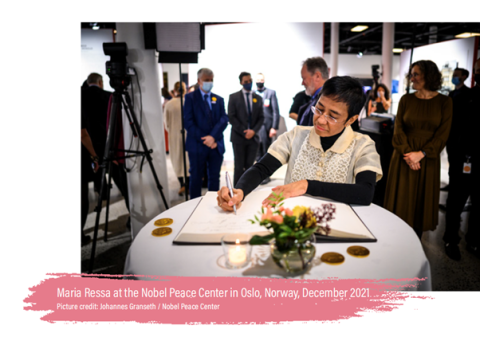
Maria Ressa, a 2021 Nobel Peace Prize laureate, is one of three journalists in focus in big data case studies produced for ICFJ's groundbreaking research project spanning three years, and culminating in the publication of The Chilling: A global study of online violence against women journalists. The UNESCO-supported publication features new tools and over 100 recommendations to help fight a global scourge that threatens journalists’ safety and poisons democratic discourse.
Below is the foreword Ressa wrote for the book, which was published this week.
When I first came under attack online in 2016 after Rodrigo Duterte was elected the President of the Philippines, the deluge of hate was overwhelming. I was a CNN war correspondent for two decades, but nothing in the field prepared me for the orchestrated, misogynistic attacks on me and our women-led news outlet, Rappler.
Then, at a pivotal moment in 2017, when I was still just learning to deal with this new networked weapon against journalists, this study’s lead author - ICFJ’s Dr. Julie Posetti - convinced me that I should be speaking up about these attacks – and within 24 hours I did an interview with her for a book she was working on for UNESCO, aptly titled An Attack on One is An Attack on All. So, I took a risk and went public about the online violence I was living with. That was when I learned that the only the defense a journalist has against these attacks is to do our jobs - to shine the light.
That same year, Philippine government propagandists tried to get the hashtag #ArrestMariaRessa trending. They failed, but they kept at it, and two years later I was arrested – twice – in a little more than a month. At the time of writing, I am fighting a conviction for criminal cyber libel and seven other cases being prosecuted by my government.
At the time of writing, I am fighting a conviction for criminal cyber libel and seven other cases being prosecuted by my government.
In the past six years, I have been repeatedly threatened with rape and murder, dehumanized in ways I couldn’t have imagined in a disinformation-laced campaign designed to shut me up, and shut Rappler down. Our data and investigations show these attacks are fuelled by the State, enabled by the technology platforms, and directly linked to the legal harassment I experience in the Philippines that threatens me with decades in prison.
Women journalists targeted by online violence at the nexus of racism, homophobia and other forms of discrimination are even more vulnerable to networked disinformation and gaslighting designed to silence critical reporting and bury the truth, as you’ll read in this book.
Crucially, it delivers unassailable data to demonstrate its findings and recommendations, including analysis of over 2.5 million social media posts directed at me and my UK colleague Carole Cadwalladr. That data analysis proves that we are being prolifically attacked online because we are women, and because we are journalists who refuse to be intimidated into silence.
Even worse, these networked attacks are changing the people who see them and who take part in them: social media has become a behavior modification system that is bringing out the worst in all of us, creating emergent behavior that strips out the best of humanity. The Chilling is a vital, at times gut-wrenching call to action - one that we cannot afford to ignore.